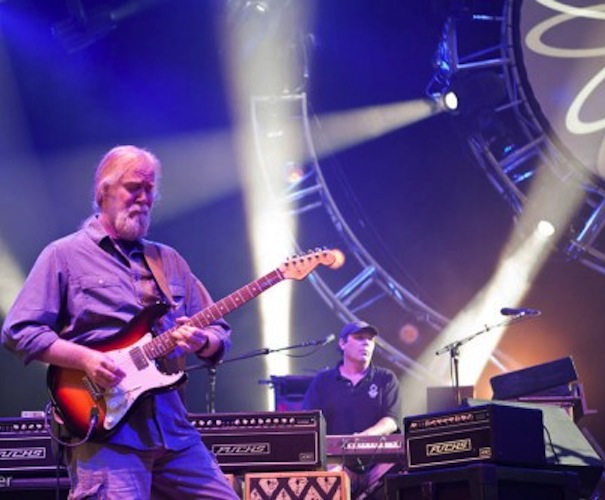Fuse Rock Concert Review: Widespread Panic Hits a Collective Groove
Even by Widespread Panic’s intuitive standards, this was a fairly challenging show: The setlist seemed to favor their deeper, less outgoing material.
By Brett Milano
If you hate the very idea of jam bands, Widespread Panic is probably the last one that will ever change your mind. Singer John Bell’s voice, a deep and drawling howl, isn’t exactly pop-friendly. They throw out very few bones in terms of catchy tunes or cut-loose rock & roll moments; one or two “thank you’s” will exhaust their stage patter. And unless the sight of six guys deeply absorbed in their music qualifies as stage presence, they have exactly none of that. If you can’t follow this band into their personal zone, you’re pretty much lost.
But there are ample rewards if you can, as Friday’s set at Boston’s Blue Hills Bank Pavilion proved. Even by Panic’s intuitive standards, this was a fairly challenging show: The setlist seemed to favor their deeper, less outgoing material, and even the night’s cover tunes had a somewhat ominous feel: Coming out of the mid-set drum break, often the place where they jack up the tempo, they instead broke out a cover of War’s “Slippin’ Into Darkness.” Another cover, earlier in the set, seemed to set the tone for the evening: Talking Heads’ “City of Dreams,” the finale of that band’s largely-overlooked True Stories soundtrack album. It’s a haunting and bittersweet song (and not the first obscure Heads cover the band’s done; another regular is “Papa Legba” from the same soundtrack). The elegiac mood carried over into their own “Second Skin,” a twelve-minute slow-burner whose chorus peaks were worth the long buildup.
The first half of the two-and-a-half hour set included some standout solos—mostly from guitarist Jimmy Herring, a fluid and inventive player—but it took a few songs before the band hit a collective groove. Tellingly, the early-set stab at a goodtime number (“Coconuts”) didn’t quite click; for whatever reason their heart this night was in the more downcast tunes. They drew from their late friend and collaborator Vic Chesnutt for “Aunt Avis,” a cry for help that brought out some guttural howls from Bell and a searing solo from Herring. If that sounds like heavy going, there were some Caribbean rhythms to provide reassurance. And there was finally some upbeat release on the encore, Warren Zevon’s “Lawyers, Guns & Money,” a throwback to Panic’s early days on the Georgia frathouse circuit. If the number of dancers in the aisles was any indication, it was a moment a good portion of the crowd had waited for.
New Orleans’ funky jammers Galactic did an hour-long opening set that was very different from their headline show at the House of Blues last January: For one thing recently-added singer Maggie Koerner was absent (she’d missed a flight), so the set was largely instrumental. This left more room for the individual players to stretch out—Robert Mercurio even got a rare bass solo-and there were additional chances to be dazzled by Stanton Moore’s drumming. One of Moore’s latest tricks is to hold a tambourine in one hand, alternately using it as a drumstick and a drum, working New Orleans parade rhythms into the mix. Boston-based singer Ryan Montbleau joined in for their finale, Paul Simon’s “50 Ways to Leave Your Lover.” That tune features one of the busiest drum parts ever to appear on a hit record, and Moore was even able to coax some funk out of that.
Brett Milano has been covering music in Boston for decades, and is the author of Vinyl Junkies: Adventures in Record Collecting (St. Martins, 2001) and The Sound of Our Town: A History of Boston Rock & Roll (Commonwealth Editions, 2007). He recently returned from New Orleans where he was editor of the music and culture magazine OffBeat.

